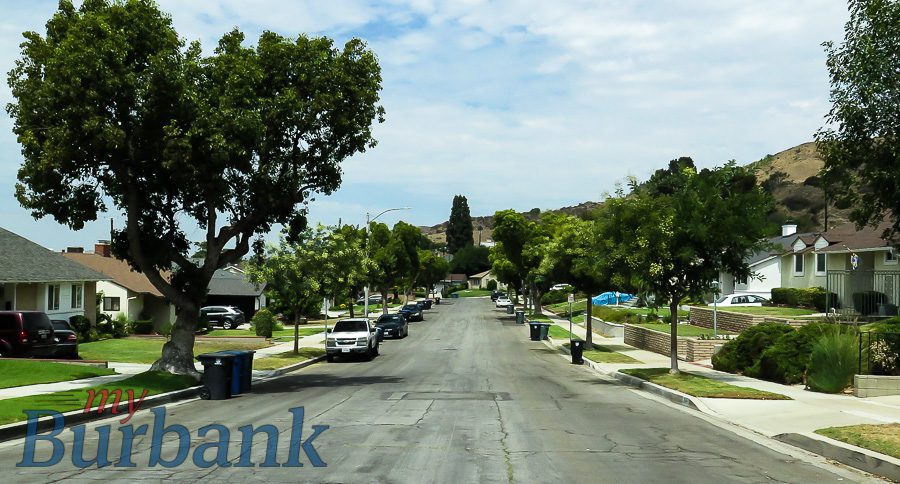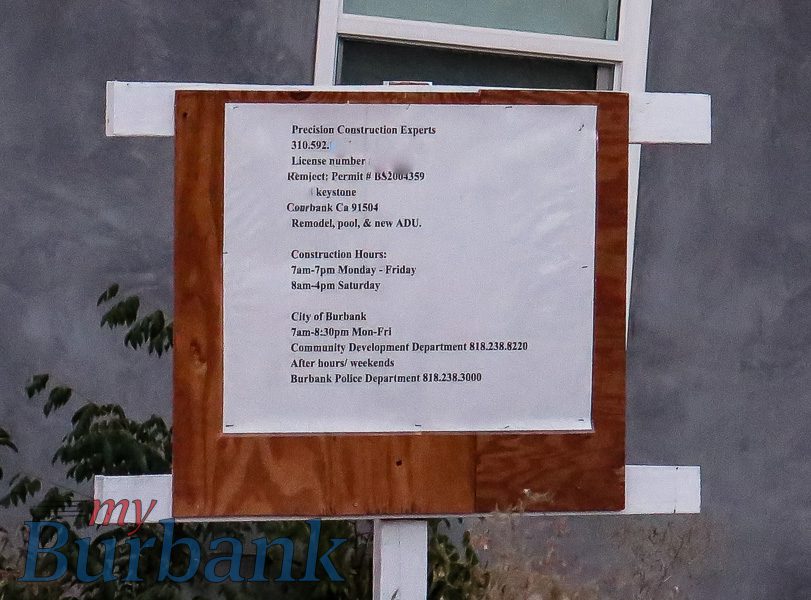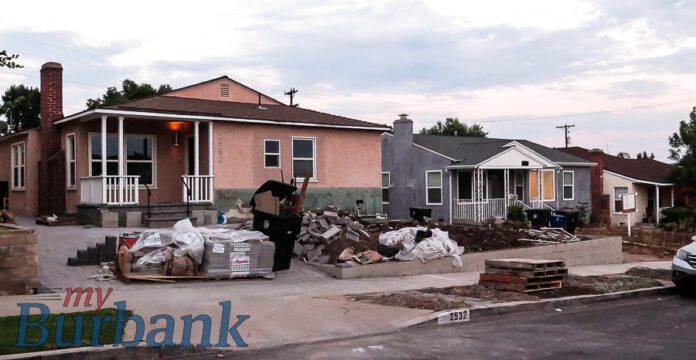Editor’s Note: This is the second in a three-part series to educate myBurbank readers and our community about the bad housing bills pending in Sacramento this year. Part Two: We dive into two current bills being discussed in Sacramento and Accessory Dwelling Unit (ADU) laws.
by Sharon Springer
Burbank City Council
former MAI, Member Appraisal Institute
Master of City and Regional Planning
Please note: The opinions expressed herein, are not necessarily those of the entire Burbank City Council.

In recent years, there’s been a frenzy of legislation activity, such as density bonus and Accessory Dwelling Unit (ADU) laws, to correct, overnight an issue that has been developing for nearly fifty years – the shortage of affordable housing. Please be aware of active Senate Bills 9, 10 among others that if passed will have lasting social, economic well-being, and quality of life impacts on Burbank for generations to come. Local control is being stripped away and cities are threatened with lawsuits and funding losses if we don’t obediently fall in line and accept this legislation that empowers Sacramento bureaucrats to make decisions for local communities using one-size-fits-all policies. The existing and proposed legislation has contributed to a speculator and investor boom and ordinary Burbankers are priced out of the housing market.

Cities are shamed and bullied and the stability of all Burbank neighborhoods is threatened. Burbank and other cities are blamed for the undersupply that has been in the making since at least 1970 and was accelerated by the loss of tax increment financing which had been used very successfully to subsidize and produce affordable housing.
Reliance on inconsistent data calls in to question the State’s assertions. For example, the California Department of Housing and Community Development estimates that California needs 1.8 million units by 2025 while at the same time 2018 Census data estimates that there are 1.2 million vacant homes in California.
The housing commoditization trend and short-term vacation rental conversions will only exacerbate the situation. We face outcomes equal to a feudal system of land barons and serfs/peasants. If you’re not already a property owner, sadly, you’ll likely be pushed further into a peasant position, as the opportunities for ownership will be further out of reach than ever as a result of misguided policies.
Early Signs Show ADU Law Contributed to Increased Housing Cost
An ostensible goal of Senate Bills 9 and 10 is to increase affordability with density as the magic bullet. We’ve heard this before and had policy pushed through with these same goals. Given that we’ve already bought into that line of reasoning once, it’s worth asking: When do these State laws start to work for the hardworking people of Burbank and other California cities?
On January 1, 2020, California State ADU laws overrode Burbank’s and other cities’ local, carefully planned ordinances. Burbank did its best to edit for health and safety issues within the confines of the law (ADU is Accessory Dwelling Unit, also known as a granny flat.) Effectively, single-family zoning was eliminated and the entire State of California was up-zoned so that three units are now allowed on a single-family lot. Owner occupancy requirements were eliminated. What were once single-family lots and homes are now more valuable due to multi-family and income-generating potential. Did the promise of increased affordability become a reality then?
– Burbank home prices exploded almost 24% from $838,000 at the beginning of the statewide up-zoning to a shocking $1,036,481 in June 2021 (Zillow).
-Burbank applications for ADU construction more than doubled from 142 in 2019 to 315 in 2020. The annualized rate for 2021 is 406 applications.
When does State ADU policy deliver on its promise of affordable housing? Now, any Burbanker trying to buy a home must compete with investors and other cash offers that in some cases are hundreds of thousands of dollars over asking prices and appraised values. From a recent Bisnow article dated June 22, 2021: “With so many Americans priced out of homeownership, investors can turn an easy profit by buying up properties and renting them out.”

Similarly, statewide median California home prices surged 35% from $607,040 to $819,630 after the January 1, 2020 up-zoning to June 2021 and the Affordability index slid from 31 to 27. This increase is more than that of the previous 4 years combined!
Los Angeles County median home prices bolted 29% from $617,310 to $796,120 over the same time period, and the Affordability Index declined from 27 to 25. Affordability Index measures the percentage of households that can afford to purchase a median-priced, single-family home. (California Association of Realtors) Therefore, only 25% of Los Angeles County households can afford to buy a median-priced single-family home, a decreasing number that is only going to get worse if we can’t demand policy with accountability.
State ADU law seems to have created a positive feedback loop. ADU up-zoning policy is driving up prices and results in the need for families to construct housing in the garage or backyard for family members priced out of the housing market due to the up-zoning. Or, for new purchasers, a rental ADU is constructed to help pay the high mortgage that is required to finance the higher home price resulting from the up-zoning. There are no requirements for affordable rent.
According to Forbes, over this same 2019 to 2020 time period, California’s richest residents increased their net worth 18% to $815 billion. Purchase of second and vacation homes was the highest in 4 years. The bottom line is that owning a home has become a dream that is less and less achievable for families, while at the same time the wealthiest among us have seen their opportunities continue to rise.
Where’s Sacramento’s accountability? What and where are the measures of success or failure? What recourse is there for these failed housing laws? How much time do we give these laws?
SB9 and SB10 are being pushed through the California legislature primarily by the Bay Area politicians responsible for the damage already done. These bills would increase the number of housing units allowed on a single-family lot to four (and more) in SB9 and up to 14 in SB10.
Who will Benefit? Ordinary residents and families likely will not. Renters trying to become homeowners likely will not. Families unable to accumulate a generational nest egg will not.
Investors benefit, the wealth gap widens, absentee corporate landlords thrive, ordinary residents are shut out of the housing market, and affordability declines; homelessness increases, and residents leave California just trying to survive, and in pursuit of the American Dream. California Annual 2020 net migration was negative 261,000.
The proposed Sacramento housing legislation is the newest wave of redlining: If you’re not already in, you’re out. The impacts are as insidious as the old redlining that the proponents of Senate Bills 9 and 10 claim to decry.
These bills are being promoted with the same empty promises as the previous misguided bills, and have the potential to wreak exponentially higher damage to working households as a result. Density at all cost and without consideration for the nuances and residents of every community will result in the further exploitation of families trying to live and thrive in our great state. There has been no accountability for the broken density policy of yesterday, so why the rush to expand something that clearly not only hasn’t lived up to its promises but in fact has made ownership and wealth disparities worse?
Next Up: What can be learned from the experience in Minneapolis? Did the up-zoning from one full home to 3 full homes result in increased affordability or not?




















Excellent article. I am deeply sympathetic to the homeless crisis and the lack of affordable housing. And full disclosure – I am one of the fortunate who purchased a home in Burbank ndecades ago. However, LA in general (and Burbank specifically) are highly-desirable places to live. If costs are too steep. and/or the acting/directing/writing gig isn’t working out as hoped, there are many other far more affordable options, including the 1M plus vacant homes around CA. I am horrified by the thought of up to four families living on one 7,000 sq ft lot (2 duplexes) in Burbank. This would destroy our city, while lining the pockets of opportunistic investors who don’t give a rip about quality of life. My concerns include (among countless others):
1) Overcrowding/Congestion/Traffic
2) Noise Pollution (including the construction frenzy if these bills pass)
3) Street Parking in residential neighborhoods
4) Public School class sizes
5) Infrastructure strain (Broadband, Electricity, Water, Sewage, Roads). With the exception of roads, these necessities are already being pushed far beyond original “normal” operating levels due to distance learning and remote workers. I for one have been extremely conscientious about doing my part to ease the water shortage and limit power utilization, will we be expected to reduce our consumption even more? My lawn is dead, our A/C is at 79, we’ve replaced every appliance, we only flush after #2 (sorry for the specificity, but making a point). And I have been told countless times by Spectrum that our broadband infrastructure is dangerously overdue for a full upgrade. It cannot keep up with demand, it fails repeatedly. Nodes are constantly being “re-balanced” to support traffic/utilization patterns/demands, but I have had at least 50 outages in the past year, often when I’m working from home. This issue is only going to get worse as technology evolves and bandwidth requirements rise.
Just my 2 cents, I hope these bills get crushed.
Thanks for sharing.
I always like to point out that when I first moved into my home here I was working hard, had to share my home to make ends meet and before coming to Burbank, I had to work my way up…from living in South Central LA and West Adams. Not everyone can afford to live everywhere including Burbank. There are lots of very nice places to live in America. If you can afford our beautiful City, great. If you can’t, it’s not fair to twist our arms, take our tax money to help shore up your living situation. Being poor is not genetic. I have been broke as a joke and I know that anyone can bring themselves up to any level they wish to achieve.
More nonsense from the person(s) who worked hard to create this problem in the first place. Each time Sacramento mandated more housing, our council – Springer & Gabel-Luddy included, tried to get cute and install impediments, end run after end run if you will. They were very successful.
Supply and demand, baby. If rents are high, blame the council for stopping building for over thirty years. Now, with more units coming we will have competition and rents may lower as we have more supply. One of the big questions is who has benefited with home and apartment development being stopped for over 30 years? Who are Burbank’s biggest owners of rental units…
Increasing the housing stock in Burbank is a good thing and should be welcomed and encouraged.
If this or any past council really wanted to stimulate the creation of housing units, they could have done DOZENS of things to encourage and facilitate it, but the fact is they stayed awake at night dreaming of news ways to stop it. I do not believe a word of the gibberish, gobbledygook or tainted “facts” they spew.
Joel, do you agree or disagree that Burbankers should never pay more so that someone can “afford” to live here? Measure after measure drains our wallets to fund “low income” housing. Why not just let private developers do their job and have the City stay out of the matter entirely?
“How dare a poor person try to live near me, a good person”
…just one more thing. I want to respond to the council woman Springer’s ideas about home ownership. Home ownership is obtainable to anyone who wants it. It will not happen overnight. First, you must spend less than you earn and smartly invest the difference. This means you will will need to perhaps get a roommate in your domicile now, forgo the latest Iphone and giant screen T.V. (including that monthly cable package), miss out on that cup of coffee at Starbucks, put that bong down and stop smoking anything, and stop relying on ‘free’ stuff from the city council and government. YES, it is a sacrifice, but it will pay dividends. It also helps to have a job, hold a job and be good at what you do. You may want to work a second job as well. It helps to have no debt and pay no interest to anyone. I know of many people who have a plan and stick to it. I can promise you one thing, the months and years will pass whether you have a plan or not. Springer and the others (our school system included) will not explain these simple truths as it is not in their best interest.
I have helped many people get ahead and I am willing to help you if you ask. I’m not hard to find…
There isn’t a housing shortage, there’s an AFFORDABLE housing shortage. Big difference. Those who suggest someone can just move to a less affordable area seem to out of touch with the housing situation in general. The rate at which housing costs have increased is exponentially greater than increases in wages. When my parents bought their modest home in Burbank 30 years ago, their combined wages were roughly 2/3 of what their house cost. My spouse and I make double what our parents did, but a comparable home costs 8 to 10 times our yearly wages. We are both college educated with good jobs. There is no comparison. I work in housing and much of what Sharon says is what I have also witnessed. 50% of the nations single family homes are now corporate owned. Something has to give.
I hope Burbank and the city council members fight hard to maintain local control of development. It appears that the city council got caught flat footed and outsmarted by a developer using SB35 at the site of Pickwick to develop 98 housing units. I am not a Rancho resident but I do support maintaining the character of the neighborhood and the equestrian lifestyle. Allowing these crazy high density developments in an area like the Rancho Equestrian neighborhood is going to rip the heart right out of this special and beautiful part of our city. I really don’t understand how the city council missed being fully informed about the ramifications of SB35? I applaud Council member Springer here, as discussed in her guest article, trying to work hard and work smart in trying to deal with these overreaches of the state government.
So far no commentators have discussed who’s behind SB9 and 10 (and AB 478). Scott Wiener
and Toni Atkins’ bills were actually drafted by YIMBY (Yes In My Back Yard). Now about 150,000 strong, YIMBYs are young techies lavishly funded by Silicon Valley giants to lobby state and local legislators to pass SB9 & 10–build up to 14 apartments on single family lots. These tech giants don’t want to move to Austin like Tesla and HP. They want to grow here, but their young hires need apartments. Those 14 apartments on each lot are not for average wage earners; they are market rate and luxury units. Wiener has said single family homes are “immoral”. Well, I think developers circling our neighborhoods and outbidding families for homes to demolish — that is immoral. And tech giants, developers, builders and unions, and real estate lobbies that contribute to the campaigns of these bills’ authors and promoters are
also immoral.
The issues boil down to who will control the type and quality of housing built in Burbank. Will it be the local residents through the auspices of the city council, or will it be the State? If these and/or similar bills pass, the answer will be … neither. The State will have surrendered its decision making power to the real estate investors and developers. And they will build what they believe will be most profitable for them, without consideration for the best interests of the people who call this city their home.
After nearly 30 years of living in Burbank, this home owner is selling up to the highest bidder and moving out of Burbank and probably California. I am not obliged to subsidize housing costs. You live where you can afford live. I’d love to live in Beverly Hills or Malibu but I don’t because I can’t afford a house there.
Can’t we do more to discourage vacancies? The house next to us has been vacant for four years now. While I enjoy the peace and quiet of only having neighbors to one side and behind, the house sits there, unoccupied, while the owner (he doesn’t need it, it was his mom’s, he comes by to water the grass regularly) pays a measly $300/year in property taxes.
Comments are closed.